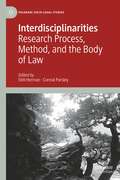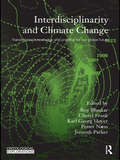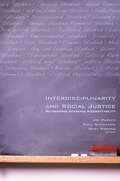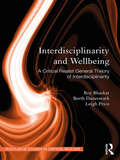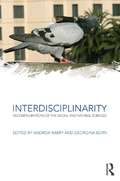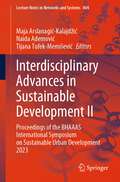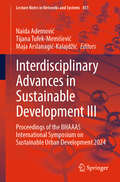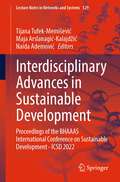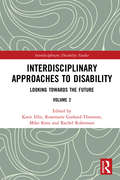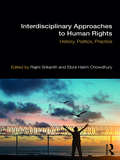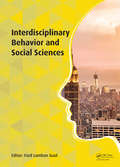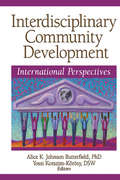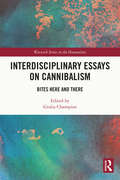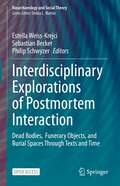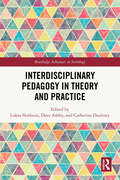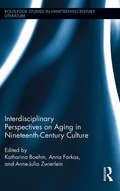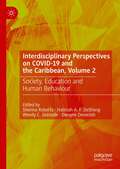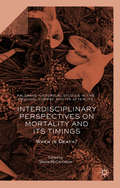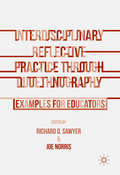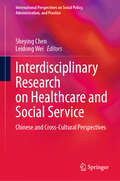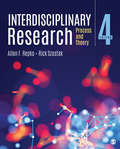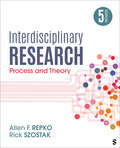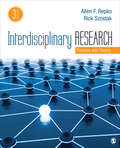- Table View
- List View
Interdisciplinarities: Research Process, Method, and the Body of Law (Palgrave Socio-Legal Studies)
by Didi Herman Connal ParsleyThis book illuminates methodology in legal research by bringing together interdisciplinary scholars, who employ a diverse set of methodologies, to address a specific shared research challenge: ‘the body’. The contributors were asked a question: if you were invited to contribute to an edited book on ‘the body’, where would you start and then where would you go? The result is a self-reflective discussion of how and where researchers engage with methodological practices. The contributors draw on their own interdisciplinary research experiences to explore how ‘the body’ might be addressed in their work, and the resources they would deploy in order to carry out the task. This ‘book within a book’ is innovative in both content and format. It provides a rare insight into how top interdisciplinary legal scholars go about making decisions about their research. The shared device of ‘the body’ allows the volume to trace a number of rich approaches into the process of research as practiced by these diverse scholars. In presenting thinking and research in action, the volume offers a new, self-reflective view on the much-addressed theme of the body, as well as taking a fresh approach to the historically vexed problem of research methodology in legal studies.
Interdisciplinarity and Climate Change: Transforming Knowledge and Practice for Our Global Future
by Roy BhaskarInterdisciplinarity and Climate Change is a major new book addressing one of the most challenging questions of our time. Its unique standpoint is based on the recognition that effective and coherent interdisciplinarity is necessary to deal with the issue of climate change, and the multitude of linked phenomena which both constitute and connect to it. In the opening chapter, Roy Bhaskar makes use of the extensive resources of critical realism to articulate a comprehensive framework for multidisciplinarity, interdisciplinarity, transdisciplinarity and cross-disciplinary understanding, one which duly takes account of ontological as well as epistemological considerations. Many of the subsequent chapters seek to show how this general approach can be used to make intellectual sense of the complex phenomena in and around the issue of climate change, including our response to it. Among the issues discussed, in a number of graphic and compelling studies, by a range of distinguished contributors, both activists and scholars, are: The dangers of reducing all environmental, energy and climate gas issues to questions of carbon dioxide emissions The problems of integrating natural and social scientific work and the perils of monodisciplinary tunnel vision The consequences of the neglect of issues of consumption in climate policy The desirability of a care-based ethics and of the integration of cultural considerations into climate policy The problem of relating theoretical knowledge to practical action in contemporary democratic societies Interdisciplinarity and Climate Change is essential reading for all serious students of the fight against climate change, the interactions between governmental bodies, and critical realism.
Interdisciplinarity and Social Justice: Revisioning Academic Accountability (SUNY series, Praxis: Theory in Action)
by Mary Romero Joe Parker Ranu SamantraiIn the 1960s and 1970s, activists who focused on the academy as a key site for fostering social change began by querying the assumptions of the traditional disciplines and transforming their curricula, putting into place women's and ethnic studies programs that changed both the subject and methods of scholarship. The pattern of scholars and activists joining forces to open fields of research and teaching continued in subsequent decades, and recent additions, including critical race studies, queer studies, cultural studies, and postcolonial studies, take as their epistemological foundation the inherently political nature of all knowledge production. Interdisciplinarity and Social Justice seizes this opportune moment in the history of interdisciplinary fields to review their effects on our intellectual and political landscape, to evaluate their ability to deliver promised social benefits, and to consider their futures. The essays collected in this volume detail histories of the interdisciplinary fields that emerged from social movements, examine how effectively they have achieved their goals of intellectual and social change, and consider the challenges they now face inside and outside the academy.
Interdisciplinarity and Wellbeing: A Critical Realist General Theory of Interdisciplinarity
by Roy Bhaskar Berth Danermark Leigh PriceIn this book, the authors provide a much-needed general theory of interdisciplinarity and relate it to health/wellbeing research and professional practice. In so doing they make it possible for practitioners of the different disciplines to communicate without contradiction or compromise, resolving the tensions that beset much interdisciplinary work. Such a general theory is only possible if we assume that there is more to being (ontology) than empirical being (what we can measure directly). Therefore, the unique approach to interdisciplinarity applied in this book starts from ontology, namely that there is a multimechanismicity (a multiplicity of mechanisms) in open systems, and then moves to epistemology. By contrast, the mainstream approach, which fails to acknowledge ontology, is “unserious” and tends to result in a methodological hierarchy, unconducive of interdisciplinarity, in which empiricist science is overtly or tacitly assumed to be the superior version of science. This book is primarily aimed at those people interested in improving health and wellbeing – such as researchers, policy-makers, educators, and general practitioners. However, it will also be useful to academics engaged in the broader academic debate on interdisciplinary metatheory.
Interdisciplinarity: Reconfigurations of the Social and Natural Sciences (CRESC)
by Andrew Barry and Georgina BornThe idea that research should become more interdisciplinary has become commonplace. According to influential commentators, the unprecedented complexity of problems such as climate change or the social implications of biomedicine demand interdisciplinary efforts integrating both the social and natural sciences. In this context, the question of whether a given knowledge practice is too disciplinary, or interdisciplinary, or not disciplinary enough has become an issue for governments, research policy makers and funding agencies. Interdisciplinarity, in short, has emerged as a key political preoccupation; yet the term tends to obscure as much as illuminate the diverse practices gathered under its rubric. This volume offers a new approach to theorising interdisciplinarity, showing how the boundaries between the social and natural sciences are being reconfigured. It examines the current preoccupation with interdisciplinarity, notably the ascendance of a particular discourse in which it is associated with a transformation in the relations between science, technology and society. Contributors address attempts to promote collaboration between, on the one hand, the natural sciences and engineering and, on the other, the social sciences, arts and humanities. From ethnography in the IT industry to science and technology studies, environmental science to medical humanities, cybernetics to art-science, the collection interrogates how interdisciplinarity has come to be seen as a solution not only to enhancing relations between science and society, but the pursuit of accountability and the need to foster innovation. Interdisciplinarity is essential reading for scholars, students and policy makers across the social sciences, arts and humanities, including anthropology, geography, sociology, science and technology studies and cultural studies, as well as all those engaged in interdisciplinary research. It will have particular relevance for those concerned with the knowledge economy, science policy, environmental politics, applied anthropology, ELSI research, medical humanities, and art-science.
Interdisciplinary Advances in Sustainable Development II: Proceedings of the BHAAAS International Symposium on Sustainable Urban Development 2023 (Lecture Notes in Networks and Systems #804)
by Naida Ademović Tijana Tufek-Memišević Maja Arslanagić-KalajdžićThis book presents a progressive effort in enhancing scientific research pertaining to sustainable development, with particular emphasis on the Western Balkans region. It represents a comprehensive and versatile guide to sustainable urban development, that bridges diverse disciplines, combining theory and practice, to provide a multifaceted view on the topic, making it an indispensable resource for varied audiences.
Interdisciplinary Advances in Sustainable Development III: Proceedings of the BHAAAS International Symposium on Sustainable Urban Development 2024 (Lecture Notes in Networks and Systems #851)
by Naida Ademović Tijana Tufek-Memišević Maja Arslanagić-KalajdžićThis book embodies a forward-thinking initiative to advance scientific research on sustainable development; it integrates various fields, including environmental science, urban planning, civil engineering, economics, law, and social policy. By blending theoretical concepts with practical applications, it offers a multifaceted perspective on the subject, ensuring that readers acquire a comprehensive understanding of sustainable development. This interdisciplinary approach makes the book an indispensable resource for a wide range of audiences, including academics, policymakers, urban planners, environmentalists, and students. It offers valuable insights and practical tools that can be applied to real-world scenarios, thereby contributing significantly to the advancement of sustainable urban development in the elaborated regions and beyond.
Interdisciplinary Advances in Sustainable Development: Proceedings of the BHAAAS International Conference on Sustainable Development -ICSD 2022 (Lecture Notes in Networks and Systems #529)
by Naida Ademović Tijana Tufek-Memišević Maja Arslanagić-KalajdžićThis book presents interdisciplinary research and scientific outcomes in sustainable development acquired from the BHAAAS International Conference on Sustainable Development-ICSD2022 as part of the 13th Days of Bosnian-Herzegovinian American Academy of Arts and Sciences held in Sarajevo, June 23-26, 2022. The main event enabled researchers and experts from 25 countries to exchange their knowledge, ideas and experiences. The general scope of the book includes topics presented at three specialized symposia: The Quadruple Helix Approach, Sustainable Urban Development and Sustainable Civil Engineering with research topics ranging from SDGs, sustainable development education, environmental and social responsibility and consumption to sustainable retrofit strategies, urban heritage conservation, urban mobility, Space Syntax analysis, watercourse recovery, railway corridors and more. The book is recommended for fellow researchers, professionals, and students in the fields of economy, politics, architecture, urban planning, civil engineering and related fields.
Interdisciplinary Approaches to Disability: Looking Towards the Future: Volume 2 (Interdisciplinary Disability Studies)
by Rosemarie Garland-Thomson Rachel Robertson Katie Ellis Mike KentHow can a deep engagement with disability studies change our understanding of sociology, literary studies, gender studies, aesthetics, bioethics, social work, law, education, or history? Interdisciplinary Approaches to Disability (the companion volume to Manifestos for the Future of Critical Disability Studies) identifies both the practical and theoretical implications of such an interdisciplinary dialogue and challenges people in disability studies as well as other disciplinary fields to critically reflect on their professional praxis in terms of theory, practice, and methods. Topics covered include interdisciplinary outlooks ranging from media studies, games studies, education, performance, history and curation through to theology and immunology. Perspectives are drawn from different regions from the European Union to the Global South with chapters that draw on a range of different national backgrounds. Our contributors who write as either disabled people or allies do not proceed from a singular approach to disability, often reflecting different or even opposing positions. The collection features contributions from both established and new voices in international disability studies outlining their own visions for the future of the field. Interdisciplinary Approaches to Disability will be of interest to all scholars and students working within the fields of disability studies, cultural studies, sociology, law history and education. The concerns raised here are further in Manifestos for the Future of Critical Disability Studies.
Interdisciplinary Approaches to Human Rights: History, Politics, Practice
by Rajini Srikanth Elora Halim ChowdhuryInterdisciplinary Approaches to Human Rights: History, Politics, Practice is an edited collection that brings together analyses of human rights work from multiple disciplines. Within the academic sphere, this book will garner interest from scholars who are invested in human rights as a field of study, as well as those who research, and are engaged in, the praxis of human rights. Referring to the historical and cross-cultural study of human rights, the volume engages with disciplinary debates in political philosophy, gender and women’s studies, Global South/Third World studies, international relations, psychology, and anthropology. At the same time, the authors employ diverse methodologies including oral history, theoretical and discourse analysis, ethnography, and literary and cinema studies. Within the field of human rights studies, this book attends to the critical academic gap on interdisciplinary and praxis-based approaches to the field, as opposed to a predominantly legalistic focus, drawing from case studies from a wide range of contexts in the Global South, including Bangladesh, Colombia, Haiti, India, Mexico, Palestine, and Sudan, as well as from Australia and the United States in the Global North. For students who will go on to become researchers, practitioners, policy makers, and activists, this collection of essays will demonstrate the multifaceted landscape of human rights and the multiple forces (philosophical, political, cultural, economic, historical) that affect it.
Interdisciplinary Behavior and Social Sciences: Proceedings of the 3rd International Congress on Interdisciplinary Behavior and Social Science 2014 (ICIBSoS 2014), 1-2 November 2014, Bali, Indonesia.
by Ford Lumban GaolThe human aspect plays an important role in the social sciences. The behavior of people has become a vital area of focus in the social sciences as well. Interdisciplinary Behavior and Social Sciences contains papers that were originally presented at the 3rd International Congress on Interdisciplinary Behavior and Social Science 2014 (ICIBSoS 2014),
Interdisciplinary Community Development: International Perspectives
by Alice K. Johnson Butterfield Yossi Korazim-KőrösyInterdisciplinary Community Development: International Perspectives is a unique look at the innovations in interdisciplinary community development around the world. International leaders in geography, public policy, administration, social work, education, and public health explore the latest research, programs, and approaches to promote strategies
Interdisciplinary Essays on Cannibalism: Bites Here and There (Warwick Series in the Humanities)
by Giulia ChampionInterdisciplinary Essays on Cannibalism: Bites Here and There brings together a range of works exploring the evolution of cannibalism, literally and metaphorically, diachronically and across disciplines. This edited collection aims to promote a conversation on the evolution and the different uses of the tropes and figures of cannibalism, in order to understand and deconstruct the fascination with anthropophagy, its continued afterlife and its relation to different disciplines and spaces of discourse. In order to do so, the contributing authors shed a new light not only on the concept, but also propose to explore cannibalism through new optics and theories. Spanning 15 chapters, the collection explores cannibalism across disciplines and fields from Antiquity to contemporary speculative fiction, considering history, anthropology, visual and film studies, philosophy, feminist theories, psychoanalysis and museum practices. This collection of thoughtful and thought-provoking scholarly contributions suggests the importance of cannibalism in understanding human history and social relations.
Interdisciplinary Explorations of Postmortem Interaction: Dead Bodies, Funerary Objects, and Burial Spaces Through Texts and Time (Bioarchaeology and Social Theory)
by Sebastian Becker Philip Schwyzer Estella Weiss-KrejciIn the present as in the past, the dead have been deployed to promote visions of identity, as well as ostensibly wider human values. Through a series of case studies from ancient Egypt through prehistoric, historic, and present-day Europe, this book discusses what is constant and what is locally and historically specific in our ways of interacting with the remains of the dead, their objects, and monuments. Postmortem interaction encompasses not only funerary rituals and intergenerational engagement with forebears, but also concerns encounters with the dead who died centuries and millennia ago. Drawing from a variety of disciplines such as archaeology, bioarchaeology, literary studies, ancient Egyptian philology, and sociocultural anthropology, this volume provides an interdisciplinary account of the ways in which the dead are able to transcend temporal distances and engender social relationships. Until quite recently, literary sciences and archaeology were generally regarded as incommensurable in their aims, methodologies, and source material. Although archaeologists and literary critics have been increasingly willing to borrow concepts and terminology from the other discipline, this book is one examples of a genuinely collaborative endeavor.This is an open access book.
Interdisciplinary Pedagogy in Theory and Practice (Routledge Advances in Sociology)
by Catherine Duxbury Lukas Slothuus Dave AshbyThis book explores interdisciplinary university teaching in both theory and practice, drawing on the experience and expertise of educators from across the social sciences and humanities. Based around pedagogical theory and concrete practical examples and experiences from the classroom, the book contributes with a multiplicity of knowledge to the growing appetite for interdisciplinary initiatives at universities.The book is unique in offering depth and breadth of analysis of one of the most prominent experiments of interdisciplinary social science and humanities education in Britain, namely LSE100: The LSE Course, an interdisciplinary course taken by all undergraduates across disciplines at the London School of Economics and Political Science (LSE). The course has three streams, each addressing a major challenge of our time: The climate crisis, fairness, and artificial intelligence (AI).The book is of interest to academics, educators, and university leaders curious about developing and implementing interdisciplinary education in their own contexts, as well as to anyone interested in understanding the dynamics and challenges at stake in interdisciplinary educational settings. Finally, it appeals to students seeking to broaden their understanding of the social sciences beyond their own discipline.
Interdisciplinary Perspectives on Aging in Nineteenth-Century Culture (Routledge Studies in Nineteenth Century Literature #10)
by Katharina Boehm Anna Farkas Anne-Julia ZwierleinThis essay collection develops new perspectives on constructions of old age in literary, legal, scientific and periodical cultures of the nineteenth century. Rigorously interdisciplinary, the book places leading researchers of old age in nineteenth-century literature in dialogue with experts from the fields of cultural, legal and social history. It revisits the origins of many modern debates about aging in the nineteenth century – a period that saw the emergence of cultural and scientific frameworks for the understanding of old age that continue to be influential today. The contributors provide fresh readings of canonical texts by Charles Dickens, Elizabeth Gaskell, Anthony Trollope, Thomas Hardy, Henry James and others. The volume builds momentum in the burgeoning field of aging studies. It argues that the study of old age in the nineteenth century has entered a new and distinctly interdisciplinary phase that is characterized by a set of research interests that are currently shared across a range of disciplines and that explore conceptions of old age in the nineteenth century by privileging, respectively, questions of agency, of place, of gender and sexuality, and of narrative and aesthetic form.
Interdisciplinary Perspectives on COVID-19 and the Caribbean, Volume 2: Society, Education and Human Behaviour
by Sherma Roberts Halimah A. F. DeShong Wendy C. Grenade Dwayne DevonishCaribbean countries have had to navigate multiple crises, which have tested their collective resolve through time. In this regard, the region’s landscape has been shaped by an interplay of vulnerability and resilience which has brought to the fore possibilities and contradictions. It is within this context that the effects of the COVID-19 pandemic must be considered. Interdisciplinary Perspectives on COVID-19 and the Caribbean, Volume 2: Society, Education and Human Behaviour provides a comprehensive, multi- and interdisciplinary assessment of the impact of the COVID-19 pandemic, using the Caribbean as the site of enquiry. The edited collection mobilises critical perspectives brought to bear on research produced within and beyond the boundaries and boundedness of conventional academic disciplinary divides, in response to the multi-dimensional crises of our time. This volume is divided into four (4) parts consisting of twenty-three (23) chapters and weaves together four broad thematic strands: COVID-19 and Caribbean Society; COVID-19 Religion and Rights; Psycho-social Impacts of COVID-19; and Education, Innovation, and Technology. Authors working within and across the human, social, physical and life sciences consider the myriad effects of the health crisis in the region, interrogating these experiences from the granular to macro level, utilising inter and multidisciplinary lenses. Collectively, the chapters which constitute Volume II expose the fault lines in Caribbean societies, which are deeply rooted in the region’s history and delineate the precise ways in which the pandemic has transformed lives and livelihoods in the region. The culmination of this collection offers a reimagining of our Caribbean contemporary futures in the hope of finding home-grown solutions, avenues and possibilities.
Interdisciplinary Perspectives on Mortality and its Timings: When is Death? (Palgrave Historical Studies in the Criminal Corpse and its Afterlife)
by Shane MccorristineThis book is open access under a CC BY 4.0 license.This volume provides a series of illuminating perspectives on the timings of death, through in-depth studies of Shakespearean tragedy, criminal execution, embalming practices, fears of premature burial, rumours of Adolf Hitler’s survival, and the legal concept of brain death. In doing so, it explores a number of questions, including: how do we know if someone is dead or not? What do people experience at the moment when they die? Is death simply a biological event that comes about in temporal stages of decomposition, or is it a social event defined through cultures, practices, and commemorations? In other words, when exactly is death? Taken together, these contributions explore how death emerges in a series of stages that are uncertain, paradoxical, and socially contested.
Interdisciplinary Reflective Practice through Duoethnography
by Joe Norris Richard D. SawyerThis book explores the value of duoethnography to the study of interdisciplinary practice. Through rich stories, scholars illustrate how dialogic and relational forms of research help to facilitate deeply emic, personal, and situated understandings of practice and promote personal reflexivity and changes in practice. In this book, students, teachers, and practitioners use duoethnography to become more aware, dialogic, imaginative, and relational in their teaching. Forms of practice examined in this book include education, drama, nursing, counseling, and art in classroom, university, and larger professional spaces.
Interdisciplinary Research on Healthcare and Social Service: Chinese and Cross-Cultural Perspectives (International Perspectives on Social Policy, Administration, and Practice)
by Sheying Chen Leidong WeiResearch on healthcare and social service including professional social work is inherently an international subject. Each nation has a story of coping with the recent pandemic in the context of its political economy and cultural-historical settings. A study of various (especially non-Western) cases is essential to an adequate understanding of the undertaking. China is undoubtedly an important case with one of the largest populations on earth. It’s unique in view of so-called Chinese characteristics/style/model, sometimes fundamentally different from Western societies. Any lessons learned from the Chinese experiences would help with a better understanding of healthcare and social welfare provisions on a global scale. The book is written by a scholarly team who are experts in healthcare, social work, and related fields. Its primary audiences are scholars and students in Health/Mental Health, Social Work/Welfare/Services, Public/Social Policy, Philanthropy and Nonprofit Organizations, International/Cross-Cultural Studies, and Chinese/China research.
Interdisciplinary Research: Process and Theory
by Rick Szostak Allen F. RepkoInterdisciplinary Research: Process and Theory offers a comprehensive, systematic presentation of the interdisciplinary decision-making process by drawing on student and professional work from the natural sciences, social sciences, humanities, and applied fields. Designed for active learning and problem-based approaches, the Fourth Edition includes expanded discussion of epistemology, creativity within the interdisciplinary research process, confirmation bias and social media, the philosophy of integration, and student work patterns, mapping, and the importance of performing independent research while working through this book. An Instructor website for the book includes a test bank, PowerPoint slides, and tables and figures from the book.
Interdisciplinary Research: Process and Theory
by Rick Szostak Allen F. RepkoInterdisciplinary Research: Process and Theory offers a comprehensive, systematic presentation of the interdisciplinary decision-making process by drawing on student and professional work from the natural sciences, social sciences, humanities, and applied fields. Designed for active learning and problem-based approaches, the Fourth Edition includes expanded discussion of epistemology, creativity within the interdisciplinary research process, confirmation bias and social media, the philosophy of integration, and student work patterns, mapping, and the importance of performing independent research while working through this book. An Instructor website for the book includes a test bank, PowerPoint slides, and tables and figures from the book.
Interdisciplinary Research: Process and Theory
by Rick Szostak Allen F. RepkoThis book offers a comprehensive, systematic presentation of the interdisciplinary research process and the theory that informs it by drawing on student and professional work from a variety of fields. The book has been iterative in its development over editions, as the authors have learned from the work of instructors and students using it and have adjusted their advice in response. Notable changes in the Fifth Edition respond to feedback from the Forum devoted to this book in Issues in Interdisciplinary Studies in 2022. Examples have been updated so most are more contemporary, new content has been added on mixed methods and team research to respond to the needs of graduate students, and content has been revised throughout to address the current thinking on interdisciplinarity and integration, and strategies for achieving common ground as an interdisciplinary research team. An instructor website for the book at http://edge.sagepub.com/repko5e includes editable PowerPoint slides, a test bank, and figures and tables from the book.
Interdisciplinary Research: Process and Theory
by Rick Szostak Allen F. RepkoThis book offers a comprehensive, systematic presentation of the interdisciplinary research process and the theory that informs it by drawing on student and professional work from a variety of fields. The book has been iterative in its development over editions, as the authors have learned from the work of instructors and students using it and have adjusted their advice in response. Notable changes in the Fifth Edition respond to feedback from the Forum devoted to this book in Issues in Interdisciplinary Studies in 2022. Examples have been updated so most are more contemporary, new content has been added on mixed methods and team research to respond to the needs of graduate students, and content has been revised throughout to address the current thinking on interdisciplinarity and integration, and strategies for achieving common ground as an interdisciplinary research team. An instructor website for the book at http://edge.sagepub.com/repko5e includes editable PowerPoint slides, a test bank, and figures and tables from the book.
Interdisciplinary Research: Process and Theory
by Dr Allen F. Repko Professor Rick SzostakThe Third Edition of Interdisciplinary Research: Process and Theory offers a comprehensive and systematic presentation of the interdisciplinary research process and the theory that informs it. Authors Allen F. Repko and Rick Szostak illustrate each step of the decision-making process by drawing on student and professional work from the natural sciences, social sciences, humanities, and applied fields. Designed for active learning and problem-based approaches as well as for more traditional approaches, the book now includes more examples from real student research projects and adds more tables and figures to enliven the discussion.
